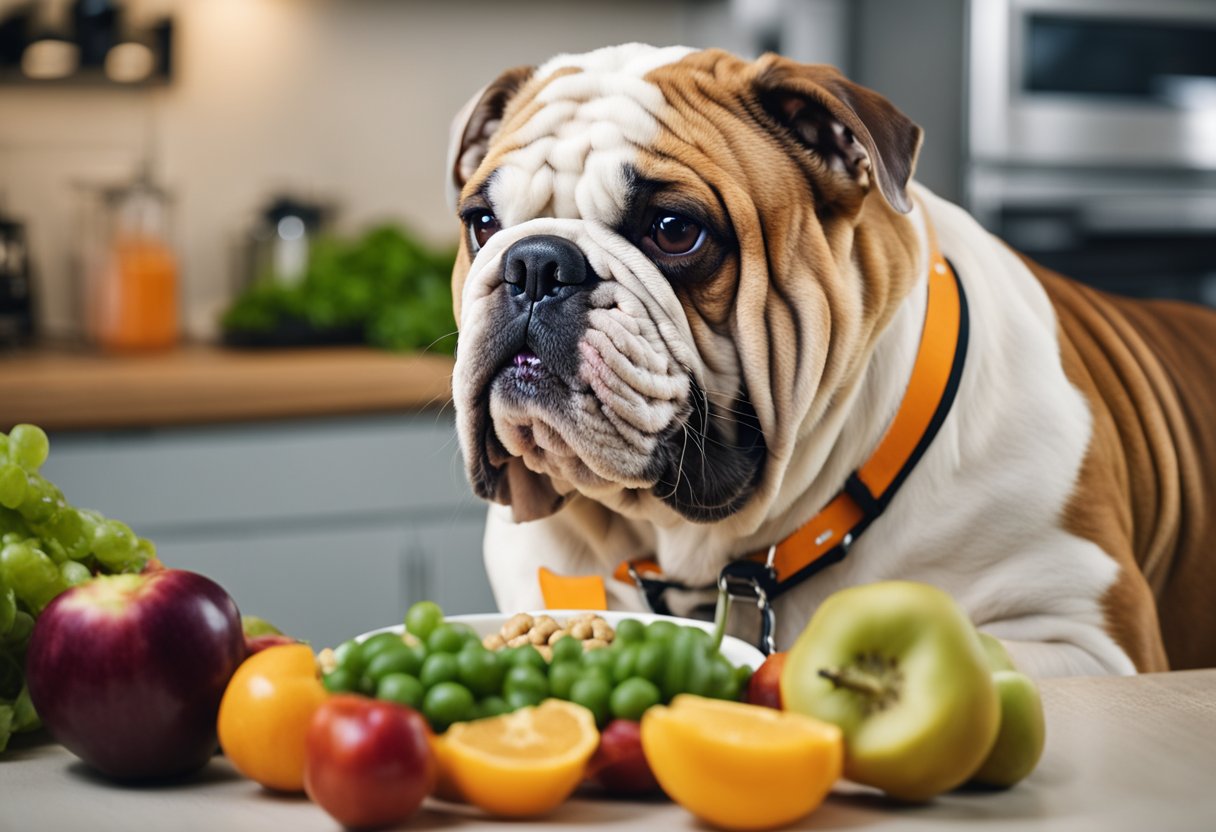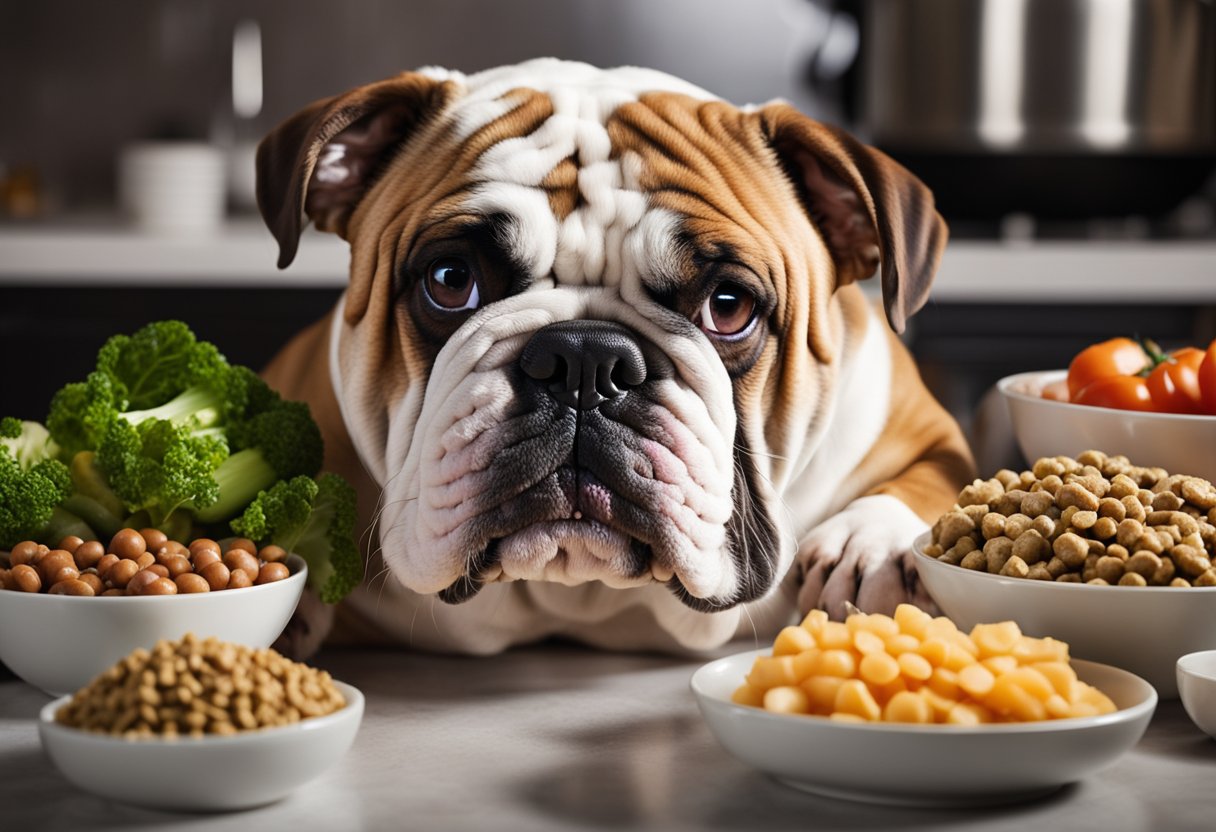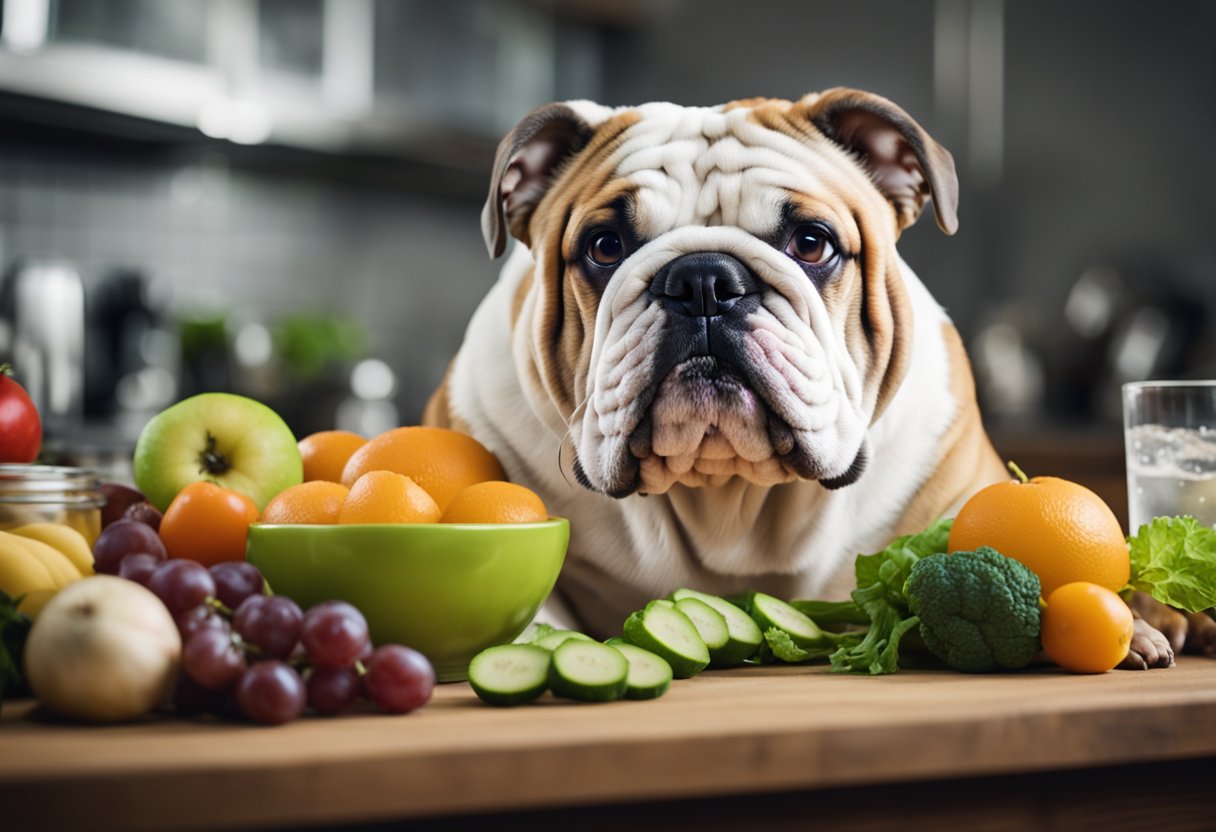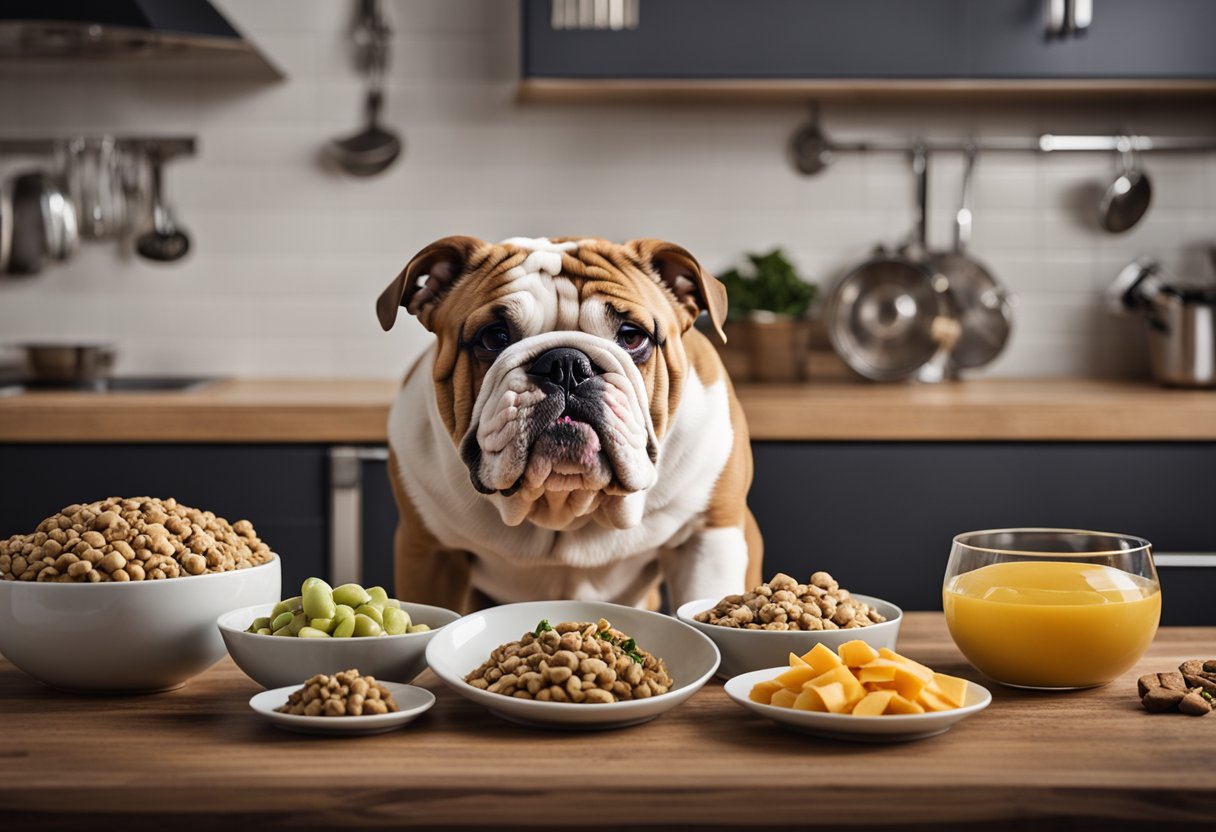English Bulldogs have distinctive dietary needs that must be carefully managed to ensure their health and wellbeing. As sturdy and compact as they are, Bulldogs benefit from a balanced diet that supports their bone structure, muscle health, and the unique challenges they may face due to their physical build. Owners must be aware of what foods are safe and which ones to avoid, as Bulldogs can be prone to obesity and food allergies, which makes choosing the right food an important decision.

When considering the diet of an English Bulldog, it’s essential to understand their nutritional needs at different life stages, which vary from puppyhood to adulthood, and into their senior years. Balanced proportions of protein, fats, and carbohydrates, along with vitamins and minerals, support their overall health, while the right hydration levels are crucial for preventing dehydration. Regular vet check-ups can help owners manage any health conditions that may require dietary adjustments.
Key Takeaways
- A balanced diet is critical for English Bulldogs’ health, considering their unique physique and potential health issues.
- It’s important to know which foods are safe and which to avoid to prevent obesity, allergies, and other health concerns.
- Proper nutrition varies with age, and regular veterinary guidance is recommended to handle Bulldogs’ diet and health needs.
Essential Nutritional Needs of English Bulldogs

Proper nutrition is crucial for English Bulldogs, focusing on balanced dietary components like proteins, fats, carbohydrates, and essential vitamins and minerals. These nutrients support their overall health, growth, and energy levels.
Proteins and Amino Acids
Proteins are the building blocks of muscle and are vital for the health and development of English Bulldogs. High-quality proteins such as chicken, beef, salmon, turkey, lamb, and eggs provide essential amino acids that help in muscle maintenance and repair.
Fats for Energy and Health
Fats are a dense source of calories and energy for Bulldogs, playing a key role in supporting a healthy coat and skin. Sources such as fish, which are high in Omega-3 and Omega-6 fatty acids, contribute to joint health and reduce inflammation.
Carbohydrates and Fiber
While often less emphasized, carbohydrates are important for providing Bulldogs with energy. Sources of carbs like oatmeal, rice, sweet potatoes, and brown rice offer not only energy but also dietary fiber, which aids in digestion.
Vitamins and Minerals
A well-balanced diet for an English Bulldog should include a variety of vitamins and minerals. Vitamin A is essential for vision and immune function, while calcium and phosphorus support strong bones and teeth. Iron and zinc are critical for various metabolic functions and maintaining a healthy immune system.
Safe Foods for English Bulldogs

English Bulldogs can enjoy a variety of foods that provide the nutrition they need to stay healthy. This list focuses on safe proteins, fruits and vegetables, and dairy alternatives that are suitable for an English Bulldog’s diet.
Protein-Rich Foods
Proteins are essential for English Bulldogs, supporting their muscle structure and overall health. Suitable protein sources include:
- Chicken: A lean meat that’s easy for Bulldogs to digest. Remove bones and skin before serving.
- Beef: Cooked beef like steak or ground beef is nutritious but should be served in moderation.
- Salmon: Offers omega-3 fatty acids for a healthy coat but must always be cooked, as raw salmon can contain harmful parasites.
- Turkey: Another lean meat option, ensure it’s cooked and free from all bones.
- Lamb: A rich source of protein but higher in fat, so it should be given occasionally.
- Eggs: Cook thoroughly to avoid the risk of salmonella and serve plain.
Vegetables and Fruits
Fresh vegetables and fruits can be great for English Bulldogs, offering vitamins and fiber. These include:
- Carrots: Crunchy and good for dental health, carrots are a healthy snack.
- Apples: Provide vitamin C and fiber, but remove all seeds before feeding to your dog.
- Bananas: High in potassium, but only offer in small quantities due to sugar content.
- Blueberries and Strawberries: Packed with antioxidants; a nutritious treat in moderation.
- Pumpkin: Cooked pumpkin is rich in fiber and helps with digestion.
- Pineapple: A small amount can be a sweet treat, but it’s high in sugar.
- Broccoli: Offered steamed or raw in small, bite-sized pieces.
Dairy and Alternatives
Some English Bulldogs can tolerate dairy, while others may be lactose intolerant. Here are safe dairy and alternatives:
- Cheese: In moderation, cheese can be a good source of protein and calcium, but choose low-fat varieties.
- Yogurt: Plain yogurt, without any added sweeteners, can be beneficial for their gut health.
- Milk: It’s generally best to avoid regular cow’s milk, as many dogs are lactose intolerant; opt for lactose-free milk instead.
Foods to Avoid for English Bulldogs

When caring for English Bulldogs, it is essential to be aware of foods that can lead to health issues such as allergies, digestive problems like vomiting and diarrhea, and conditions associated with obesity due to high fat and sugar content.
Toxic Foods
Toxic foods pose a significant risk to English Bulldogs and must be strictly avoided to prevent serious health problems. Some common toxic foods include:
- Chocolate: Contains theobromine, which is highly poisonous to dogs, leading to severe health complications.
- Onions and Garlic: These can cause oxidative damage to red blood cells and lead to anemia.
- Grapes and Raisins: Known to cause kidney failure in dogs, even in small amounts.
- Avocado: Contains persin, which can cause vomiting, diarrhea, and heart congestion.
- Caffeine: Found in coffee, tea, and certain sodas, caffeine can be lethal for a bulldog.
Harmful Human Foods
Apart from the clearly toxic items, some human foods can harm English Bulldogs due to their sensitive digestive systems. Key foods to avoid include:
- Bread and Dough: Yeast can swell in a dog’s stomach, causing pain and potentially twisting of the stomach.
- Dairy Products: Many dogs are lactose intolerant and dairy can lead to indigestion and diarrhea.
- Salt and Sugar: Excessive salt can lead to sodium ion poisoning, while sugar can contribute to obesity and dental issues.
Unhealthy Fats and Snacks
High-fat foods and unhealthy snacks can contribute to an English Bulldog’s weight gain and potential overweight issues, leading to obesity and related health problems. Bulldogs should avoid:
- Butter and High-Fat Cheeses: High in fat and can contribute to pancreatitis.
- Nuts, Especially Macadamia: Can cause vomiting, hyperthermia, and tremors.
- Fatty Meats and Snacks: Excess fat can lead to pancreatitis and other obesity-related conditions.
Feeding Guidelines for Different Life Stages

The nutrition of English Bulldogs must evolve as they progress through the various stages of life, ensuring each stage’s specific health and growth requirements are met.
Puppy Diet
Age & Growth: During the early months of life, an English Bulldog puppy undergoes rapid growth and requires a diet rich in protein and calories to support their development. They typically need to be fed high-quality puppy food that is specifically formulated for growth. The appropriate amount for English Bulldog puppies is generally around 1 to 1.5 cups of food per day, divided into multiple meals to sustain their energy levels and assist in healthy growth.
- 4 to 9 weeks: 4 meals a day
- 10 to 16 weeks: 3 meals a day
- 17 weeks to adult: 2 meals a day
Nutritional Needs: Puppy diets should be rich in essential nutrients such as calcium for strong bone development. An example of such a diet is growth-specific puppy food, which properly balances these vital nutrients.
Adult Bulldog Diet
Maintenance & Energy: As Bulldogs reach adulthood, their diet needs to shift towards maintaining their weight and health. Adults require a well-balanced diet that provides the correct calorie intake to match their energy levels, typically 2 to 3 cups of food a day, depending on their activity level and size.
Feeding Considerations:
- Less active dogs might need lower-calorie content to prevent obesity.
- Highly active English Bulldogs may require additional calories to maintain their energy.
Certain foods can contribute to better joint health, with ingredients such as glucosamine, which is vital for Bulldogs that are prone to joint issues. More details on feeding adult English Bulldogs can be found in this adult Bulldog feeding guide.
Senior Bulldog Nutrition
Health & Joint Care: In their senior years, English Bulldogs need a specially adjusted diet to manage weight and support aging joints. The focus should be on easy-to-digest, nutrient-rich foods that help maintain a healthy weight and joint function. A reduction in portion size may be necessary to match their decreased energy levels.
- Reduced calorie intake is often necessary to prevent obesity, which can exacerbate joint problems.
- Diets supplemented with glucosamine and other joint-support nutrients are beneficial for senior Bulldogs’ joint health.
Incorporating proper senior-specific Bulldog diets can aid in prolonging their health and wellbeing during the golden years.
Hydration and Water Intake
Proper hydration is essential for English Bulldogs to maintain optimal health. These dogs should have constant access to clean, fresh water. An English Bulldog’s water intake typically hinges on size, activity level, and the climate they live in. Generally, an adult Bulldog should drink about one ounce of water per pound of body weight each day.
To encourage drinking, dog owners can place multiple water bowls around the home. It’s advisable to:
- Monitor water bowls, refilling them with fresh water daily.
- Offer water after exercise to support rehydration.
If an English Bulldog has difficulty with drinking water, there are strategies to facilitate hydration:
- Add water to their food to increase intake.
- Use water fountains designed for dogs to make drinking more appealing.
It’s important to watch for signs of dehydration in English Bulldogs, such as lethargy, dry gums, and excessive drooling. If these symptoms occur, it is crucial to consult a veterinarian.
Consistent hydration supports a variety of bodily functions, including digestion and temperature regulation. Owners should ensure their English Bulldogs are adequately hydrated to help prevent heat-related issues and to contribute to overall well-being.
Managing Health Conditions Through Diet
English Bulldogs may face a range of health issues that a carefully planned diet can help manage. Addressing skin allergies, supporting digestive health, and maintaining appropriate weight are critical for their wellbeing.
Skin and Coat Health
For Bulldogs susceptible to skin conditions and allergies, diets enriched with Omega-3 and Omega-6 fatty acids can bolster coat health and reduce inflammatory responses. Foods with a balance of these nutrients contribute to a lustrous coat and healthier skin. It is vital to identify and avoid ingredients that may trigger allergic reactions.
Digestive System Support
A Bulldog’s digestive system can benefit significantly from diets that include fiber and probiotics. These components aid in digestion and can help prevent issues such as bloating and constipation. Ensuring that the Bulldog’s food is easy to chew and digest can help in avoiding unnecessary strain on their system, particularly for those with existing health conditions.
Weight Management
Obesity is a common concern with English Bulldogs, making calorie control imperative. Diets should prevent overfeeding and excessive calorie intake while still supplying essential nutrients. Regularly monitoring a Bulldog’s body condition and adjusting their food intake helps prevent weight gain and related health problems.
Treats and Occasional Snacks
For English Bulldogs, treats are more than just indulgences; they can be used as part of training or as a way to supplement their diet with extra nutrients. Owners should opt for high-quality dog treats that are specifically formulated for canines, such as the recommended Wellness CORE Crunchy Dog Treats, which contain high-quality proteins like beef.
When it comes to human food, moderation is key. Bulldogs can enjoy certain human foods given as treats. Lean proteins such as chicken, beef, and salmon are nutritious in small portions. Whole grains like oatmeal and rice can also be good in moderation, providing extra fiber and energy.
Fruits offer a natural and healthy snack alternative to processed treats. English Bulldogs may safely enjoy a variety of fruits:
- Blackberries: These are a low-calorie option rich in vitamins and antioxidants. Bulldogs can have them fresh or frozen.
- Apples (without seeds): Provide fiber and vitamin C.
- Bananas: A good source of potassium, but should be given in small amounts due to high sugar content.
However, it’s important to avoid fruits like grapes and raisins which are toxic to dogs. Always remove any pits or seeds from fruits to prevent choking or digestive issues. It’s essential to introduce any new food gradually to ensure it suits your Bulldog’s digestive system and to consult a veterinarian with any concerns about diet.
| Safe Treats | Notes |
|---|---|
| Cooked lean meats | No added fats or seasonings. |
| Certain fruits | Seedless or pitted, in moderation. |
| Specialized dog treats | Aim for high-quality brands. |
Remember to account for the additional calories from treats in the overall dietary plan to maintain a healthy weight for English Bulldogs.
Supplementation and Additional Nutrients
Proper nutrition plays a significant role in the health of English Bulldogs, and supplements can be beneficial in addressing their specific dietary needs. It is essential to tailor the addition of nutrients to match each Bulldog’s age, health condition, and lifestyle to support their overall well-being.
Joint Supplements
English Bulldogs may benefit from joint supplements to maintain good joint health, especially as they age. Glucosamine is a common supplement that supports joint function and can help to reduce the symptoms of arthritis. For senior Bulldogs or those with a history of joint issues, incorporating glucosamine supplements can be a proactive way to sustain their mobility.
Omega Fatty Acids
In English Bulldogs, the inclusion of omega fatty acids is crucial for maintaining a healthy coat and supporting their immune system. Omega-3 and omega-6 fatty acids are important for skin health, helping to reduce inflammation and combat skin allergies. Foods or supplements that are high in these nutrients can thus contribute to a shiny, well-conditioned coat and overall better health.
Minerals and Vitamins
A balanced intake of minerals and vitamins is vital for an English Bulldog’s diet. Calcium and phosphorus are important minerals for bone health, while iron is essential for blood health. A wide range of vitamins, including vitamins A, E, and D, should be provided either through diet or supplements to ensure they receive all the nutrients necessary for healthy bodily functions.
Identifying and Dealing with Food Allergies
Food allergies in English Bulldogs often manifest as skin and coat problems, such as itching, redness, and hair loss. To identify potential allergies, pay attention to signs like excessive scratching, rashes, or gastrointestinal issues which can indicate a reaction to certain foods.
Common Allergens:
- Beef
- Dairy
- Wheat
- Egg
- Chicken
Health Conditions related to food allergies can also include ear infections or paw licking. Bulldogs with chronic allergies may develop secondary health issues due to constant scratching and skin damage, such as bacterial infections.
Steps to Identify Allergies:
- Note symptoms and their frequency.
- Consult a veterinarian for testing.
- Implement an elimination diet strategy, removing common allergens.
- Carefully monitor your dog’s reaction to dietary changes.
Maintaining a Healthy Coat and Skin amidst allergies entails:
- Using hypoallergenic shampoos.
- Supplementing with omega fatty acids.
- Providing a well-balanced diet with limited ingredients.
- Ensuring prompt medical attention for skin infections.
When dealing with potential food allergies, always consult with a professional, such as a veterinarian, before making dietary changes. They may recommend blood or skin tests to identify specific allergens and assist in creating a dietary plan that minimizes allergic reactions, thus contributing to the overall health and comfort of your English Bulldog.
Understanding Food Labels and Ingredients
When selecting dog food for an English Bulldog, reading and understanding food labels is vital. The labels provide comprehensive information about the ingredients and nutrients present in the dog food, ensuring that the pet’s dietary needs are met.
Ingredients on dog food labels are listed in descending order by weight. The first few ingredients are crucial because they constitute the bulk of the food. High-quality proteins such as chicken, beef, or fish should be among the top items listed. It’s important to look for whole-food ingredients and avoid those with unspecified descriptions like “meat meal.”
Nutrients such as protein, fat, and carbohydrates are also detailed on the label, and dog owners should ensure that their English Bulldog’s diet aligns with the recommended balance of these key nutrients:
- Protein: Essential for muscle growth and repair.
- Fats: Provide energy and support healthy skin and coat.
- Carbohydrates: Supply a source of quick energy.
| Guaranteed Analysis | Importance for English Bulldogs |
|---|---|
| Crude Protein (min.) | Builds muscles and repairs tissue |
| Crude Fat (min.) | Supplies energy and maintains healthy skin |
| Crude Fiber (max.) | Aids in digestion |
| Moisture (max.) | Ensures hydration |
Dog owners should also be aware of the AAFCO statement, which indicates whether the dog food is complete and balanced for specific life stages of a pet, such as puppies or adults.
While examining the label, one should look out for any additives that might not be suitable for English Bulldogs. Artificial colors, flavors, or excessive preservatives can be harmful and are best avoided.
By understanding these label components, owners can make informed decisions to ensure their English Bulldogs consume a nutritious and well-balanced diet.
Home-Cooked Meals vs. Commercial Diets
When it comes to feeding an English Bulldog, owners often weigh the benefits of home-cooked meals against commercial diets. The choice greatly depends on the nutritional needs of the dog, the owner’s ability to provide a balanced diet, and the convenience factor.
Home-Cooked Nutrition
Home-cooked meals can be tailored to the specific health needs of an English Bulldog. By preparing food at home, owners have complete control over the ingredients, ensuring the exclusion of potential allergens or harmful foods. For tailored recipes and guidance, one can consult a homemade dog food guide specific to English Bulldogs.
However, meeting the nutritional profile that a dog requires can be complex. It is essential to ensure meals are balanced with the right proportions of protein, fat, and carbohydrates, as well as vitamins and minerals. A veterinarian or canine nutritionist can provide guidance on these requirements.
Commercial Diet Convenience
Commercial dog foods are convenient and often meet all of the nutritional standards set by pet health authorities. They are created to provide a balanced diet with every serving, and formulated foods are available specifically for different breeds, sizes, and health conditions.
Considerations
- Health: Owners must carefully consider if their English Bulldog has specific health issues that could be better managed with a custom diet.
- Convenience: Preparing a home-cooked meal daily can be time-consuming, whereas commercial diets offer convenience and speed.
- Nutrition: It’s vital to maintain nutritional balance. An improperly balanced home-cooked diet can lead to deficiencies.
In any case, whether choosing home-cooked meals or commercial diets, it is critical to regularly consult with a veterinarian to ensure the nutritional needs of an English Bulldog are being met effectively.
Factors Influencing Diet
The diet of an English Bulldog should be tailored to various specific factors that impact its nutritional needs. These factors include the dog’s activity level, size, weight, and even individual taste preferences.
Activity Level and Metabolism
English Bulldogs that are more active will require a diet with higher calories and energy to sustain their exercise routine. Conversely, Bulldogs with a lower activity level might need fewer calories to prevent weight gain. Monitoring your Bulldog’s exercise regimen aids in determining the correct caloric intake.
Bulldog Size and Weight Considerations
The size and weight of an English Bulldog significantly affect its diet. A larger Bulldog naturally needs more food, but this must be balanced carefully to avoid becoming overweight. Regular weight assessments can help adjust meal portion sizes to maintain an ideal weight.
Personal Preferences and Palatability
Just like humans, Bulldogs have personal preferences when it comes to the palatability of food. Finding a balance between healthy foods that offer optimal nutrition—rich in proteins and fats—and those that your Bulldog finds appealing is critical. Including a mix of kibbles and treats they enjoy can encourage good eating habits and overall diet satisfaction.
Final Thoughts on Feeding Your English Bulldog
When it comes to the diet of your English Bulldog, maintaining a balance of nutrition is essential for good health. They typically require about 2 to 4 cups of food per day, and an adult Bulldog’s diet should consist of high-quality dry kibble that supports their specific needs.
- Puppy Nutrition: Puppies need more protein to support their growth, but an excess can lead to health issues.
- Adult Nutrition: Shift towards maintaining muscle mass and supporting joint health.
English Bulldogs can enjoy various human foods in moderation. Fruits and vegetables, such as carrots, are excellent treats providing both nutrition and texture for dental health. Eggs also offer a good source of protein and vitamins and should be served cooked and plain.
Feeding them foods that fortify joint health is wise due to their propensity for joint issues. Bulldog owners can consider incorporating foods or supplements that support bone and joint well-being into their diets.
In managing your Bulldog’s diet, avoid overfeeding and exercise portion control to prevent obesity, which can exacerbate health problems. Also, closely monitor your pet’s reaction to new foods and consult your vet when making significant dietary changes.
By focusing on a diet rich in quality ingredients, owners can help ensure their Bulldog enjoys a happy, energetic lifestyle. Every Bulldog is unique, so what works for one may not work for another. It’s best to observe how your Bulldog responds to their feeding regimen and adjust accordingly with the guidance of a veterinarian.
Frequently Asked Questions
In catering to the dietary needs of English Bulldogs, it is vital to consider foods that promote their health and well-being. This section addresses common inquiries regarding what should and should not be included in an English Bulldog’s diet.
What types of food are safe and healthy for English Bulldog puppies?
For English Bulldog puppies, a balanced diet consisting of high-quality puppy food that supports their rapid growth phase is essential. Foods should be specifically designed for puppies to ensure the proper development of bones, joints, and muscles.
Are there any vegetables that are particularly beneficial for English Bulldogs?
English Bulldogs can benefit from vegetables like carrots, green beans, and peas, which can be added to their diet in moderation. These vegetables provide vitamins and are low in calories, helping to maintain a healthy weight.
Which human foods are safe for English Bulldogs to consume?
Safe human foods for English Bulldogs include plain cooked lean meats like chicken or turkey, and certain fruits and vegetables such as sliced apples, pumpkin, and sweet potatoes, ensuring they are prepared without seasoning or additives.
How often should English Bulldogs be fed throughout the day?
Adult English Bulldogs typically thrive on two meals per day, while puppies may require three to four smaller meals. Consistent feeding times help manage their digestion and energy levels.
What diet can help an overweight English Bulldog lose weight effectively?
An overweight English Bulldog can benefit from a diet lower in calories but rich in fiber and protein. This can help in weight control while still providing the essential nutrients they need. Consultation with a veterinarian is important to tailor an appropriate weight loss plan.
What fruits should be avoided in an English Bulldog’s diet?
English Bulldogs should not eat grapes, raisins, or fruits with pits, such as cherries, as they can be toxic or pose choking hazards. Always remove seeds from fruits like apples to prevent ingestion of any harmful substances.
